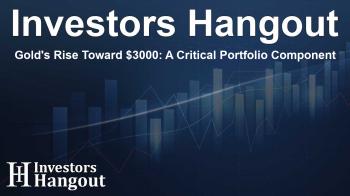Gold's Rise Toward $3000: A Critical Portfolio Component

The Importance of Gold as a Portfolio Component
In the world of investment, gold is often seen as a safe haven, especially during times of economic uncertainty. As gold prices approach the significant milestone of $3000 per ounce, it draws the attention of both investors and financial experts. Those familiar with market dynamics assert that gold is a crucial element of a well-rounded investment portfolio.
Recent Gold Prices and Market Trends
Currently trading at approximately $2,930.62 per ounce, gold has experienced a slight dip of 0.31%, yet it continues to test the important $3,000 threshold. The precious metal's 52-week range demonstrates its volatility, fluctuating between $2,015.55 and a recent high of $2,954.97, reflecting the market's keen interest and the various external factors influencing gold prices.
Performance Comparisons: Gold vs. Equities
Since the beginning of 2020, gold has delivered returns comparable to the S&P 500 index while exhibiting lower volatility. Jurrien Timmer, the Director of Global Macro at Fidelity Investments, emphasizes that in today's economic climate, characterized by potentially impaired bond markets, gold remains an indispensable component for investors seeking to diversify their portfolios effectively.
Understanding Gold's Price Dynamics
Historically, gold has maintained an inverse relationship with real yields; however, recent trends indicate a shift in this correlation. Timmer reassures investors that geopolitical events and “fiscal dominance” have reshaped traditional market behaviors, impacting how gold is valued against real yields. As the global money supply rises and real yields decline, gold's valuation dynamics continue to evolve.
Influence of Global Events on Gold Prices
The ongoing geopolitical discussions and monetary policy adjustments play a crucial role in prices and perception of gold as an investment. Factors such as central banks' decisions to purchase gold add to its allure as a financial safety net, especially during turbulent market conditions. As discussions around monetary policy intensify, the relevance of gold in portfolios may only increase.
Public Discourse Surrounding Gold Holdings
With ongoing debates about fiscal transparency, notable figures have called for a forensic examination of gold reserves held in Fort Knox. During a conference, prominent public figures suggested that citizens have a right to verify the existence of gold, framing it as a public asset, which further injects public interest and scrutiny into gold holdings.
Official Audits and Public Trust
According to Treasury Secretary Scott Bessent, Fort Knox undergoes annual audits to ensure transparency and confirm that gold reserves are intact. Despite these assurances, continuous public discussions highlight a growing desire for more transparency in how these critical national assets are managed.
Market Reactions and Price Movements
Recent movements in the stock market have seen notable indexes like the SPDR S&P 500 ETF and the Invesco QQQ Trust ETF dip slightly. As of recent trading, SPY was noted at $610.38, and QQQ followed closely at $537.23. Such changes in stock performance often prompt investors to reconsider their asset allocations, particularly the role that gold should play in maintaining overall investment health.
Future Implications for Investors
As we're observing market fluctuations and shifts in investor sentiment, the rise of gold to record prices could suggest a pivot for many investors seeking stability. With the ongoing uncertainty, the essential role of gold in portfolios remains an evolving narrative worth watching closely.
Frequently Asked Questions
Why is gold considered an essential part of a portfolio?
Gold is seen as a hedge against inflation and economic downturns, providing stability and diversification to an investment portfolio.
What recent trends are influencing the price of gold?
Factors like geopolitical tensions, changes in global money supply, and fluctuations in real yields contribute to gold price dynamics.
How does gold performance compare to stock indexes like the S&P 500?
Recently, gold has yielded returns comparable to the S&P 500 Index but typically with lower volatility, making it an attractive alternative for risk-conscious investors.
What are the implications of gold's inverse relationship with real yields?
Historically, when real yields fall, gold prices rise, though recent trends suggest this relationship is evolving due to various economic factors.
What should investors consider regarding gold and economic crises?
As a historical safe haven, gold can provide crucial protection during economic uncertainty, helping to mitigate losses from other asset classes.
About The Author
Contact Dominic Sanders privately here. Or send an email with ATTN: Dominic Sanders as the subject to contact@investorshangout.com.
About Investors Hangout
Investors Hangout is a leading online stock forum for financial discussion and learning, offering a wide range of free tools and resources. It draws in traders of all levels, who exchange market knowledge, investigate trading tactics, and keep an eye on industry developments in real time. Featuring financial articles, stock message boards, quotes, charts, company profiles, and live news updates. Through cooperative learning and a wealth of informational resources, it helps users from novices creating their first portfolios to experts honing their techniques. Join Investors Hangout today: https://investorshangout.com/
The content of this article is based on factual, publicly available information and does not represent legal, financial, or investment advice. Investors Hangout does not offer financial advice, and the author is not a licensed financial advisor. Consult a qualified advisor before making any financial or investment decisions based on this article. This article should not be considered advice to purchase, sell, or hold any securities or other investments. If any of the material provided here is inaccurate, please contact us for corrections.

